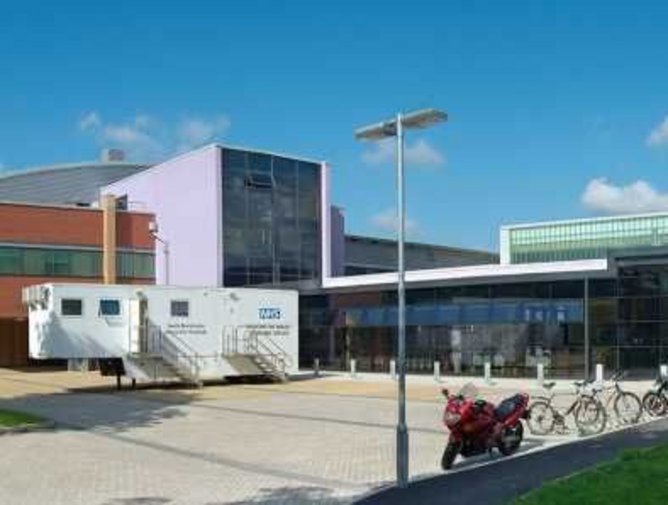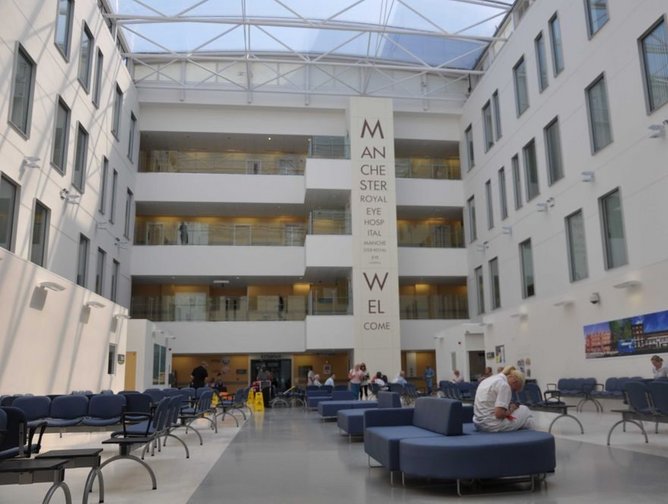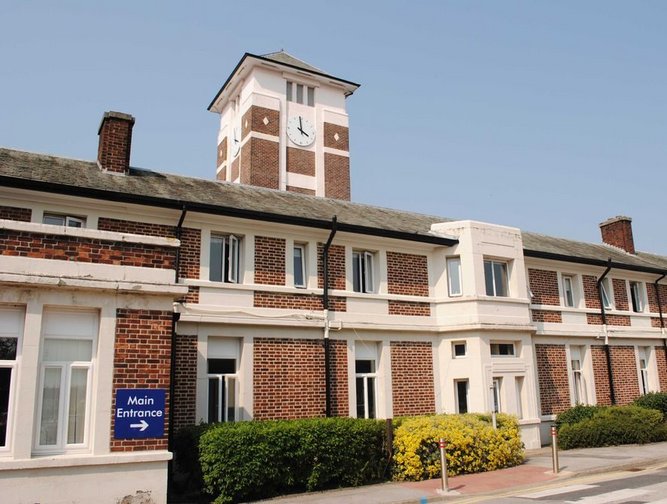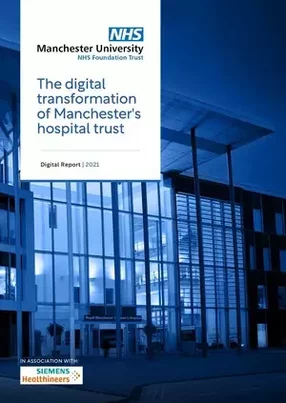The digital transformation of Manchester's hospital trust
Manchester University NHS Foundation Trust (MFT) was formed in 2017 following the merger of two of Manchester's hospitals, making it one of the largest hospital trusts in the UK with around 22,000 staff.
As its Chief Transformation Officer, Dr Veronica Devlin is overseeing the transformation element of a vast project that aims to integrate and simplify a mosaic of around 2,000 different systems, operating in 10 hospitals. The goal is to make the trust a data-driven organisation, and a key part of this is developing a new electronic patient record (EPR) system.
Working towards a go live date in summer 2022 while a global pandemic is ongoing has been a challenge, Dr Devlin explains, "but adversity does bring opportunity sometimes, and what we've all reflected on is how much more effective we could have been had we had a single electronic patient record before Covid came along. It has put a lot of unexpected demands on all our services and our need for data, for interoperability and the ability for staff to work flexibly across different areas. Having a standard approach for everything across the organisation would simplify this."
It will also benefit research initiatives, and encourage use of other technologies. "Capturing information digitally instead of on paper opens up opportunities to use things like artificial intelligence to make predictions, on emergency department demand for example.
"We'll also be moving much more into technology to manage people's healthcare at home. We already do some of that with our cardiology team for example, remote monitoring patients with rhythm disturbances. But I think more and more of that will be happening in conjunction with our community partners" Dr Devlin adds.
The EPR will also incorporate a patient portal, where people can book appointments and communicate with their clinical team. "That in itself all of a sudden changes the relationship between the caregiver and the patient, making them much more of a team rather than the patient being the recipient of care. Patients can become much more engaged and involved in their healthcare, which is what they want."
Another key development will be in medical imaging, as the Trust has recently signed a deal with Siemens Healthineers to upgrade their equipment. “Demand for our imaging services is increasing by 5%-10% every year, yet we’ve had to reduce our throughput to deal safely with COVID-19” Catherine Walsh, Divisional Director of Imaging for MFT explains.
“This new relationship gives us the confidence that we’ll be able to continue to invest in the latest technology with the flexibility to adapt it to our needs, now and into the future. All associated factors such as maintenance and budgeting are taken care of. Ultimately, the partnership will enable us to focus on delivering the best patient experience while at the same time helping us to attract and retain leading talent, and develop staff to unlock their full potential.”
“This is so much more than a transaction. It’s a 15-year Value Partnership, a relationship enabling us to provide the very best in care delivery for the people of Greater Manchester” she adds.
Internally, the trust has adopted RPA in the finance department, automating admin tasks so they can free up staff, which is helping them to address clerical staff shortages exacerbated by the Covid crisis. They've also been working closely with Siemens on interoperability between their electronic patient records and imaging systems, so information can be seamlessly brought across from people's records to be accessed by clinicians.
Dr Devlin says the pandemic has encouraged people to make quick decisions, and even take risks they wouldn't have done before, to make resources available where needed. "A huge amount of the operational teams' time is going into supporting the clinical staff, seeing how far and how fast we can go with change to support what they need to do. That's brought a massive amount of goodwill and we've seen it right across all of the NHS, with teams helping out other teams, even though people are tired."
One of the most obvious changes has been implementing virtual consultations, which happened very quickly despite the challenges. "We were able to set up some of the infrastructure and train clinicians on how to use the portal before we had all of the equipment, as some of it came behind because there were delivery delays," Dr Devlin explains.
Despite this, clinicians adopted it with ease, and it was rolled out in a peer-to-peer way. Another benefit to implementing telehealth was that it forced MFT to confront issues with wifi connectivity in parts of its buildings. "People put up with the fact that they don't have signal on their phone or can't get emails in a certain part of the building, but when you try to do a video consultation all of a sudden you see how problematic it can be. So it has flushed some of these issues out."
Now that it's been implemented, she believes telehealth is here to stay. "Younger patients seem to expect it now, and I think now that people have been consulting with their GP like this, we'll see this is how a large proportion of the country wants to carry on."
Her own partner is an example of how beneficial remote consultations can be. Despite living in Scotland, he had complex heart surgery in London, and following that had to travel to London once a year for evaluations. Now this can be undertaken virtually.
"This will be a big difference for us from the point of view of specialist intervention," she says. "It makes collaboration between his clinician in Scotland and the clinician in London much more feasible, and the communication seems to be much better."
However, large number of consultations will still need to be carried out by phone in the immediate future, as Greater Manchester has a huge amount of digital poverty. Recent research showed that nine million people in the UK experience digital poverty, having little or no access to the internet; of this figure, 40 per cent are based in northern England.
"That's one of the reasons telephone consultations have remained high, because we have a big digitally excluded population here. That will slowly change, but in the meantime there's a lot we can do by phone."
Digital poverty is one of the inequalities the pandemic has thrown into the spotlight, and while there is no easy fix, there is a big piece of work on digital inclusion currently happening within Greater Manchester. "The digital strategy for North Manchester General Hospital, which is the largest hospital in the trust, is very much centered around recognising that the local population has a high level of deprivation on all fronts. There's a completely different model of care planned for that facility and digital access is a critical part of it, because the plan is to build a new health and care campus there which is very heavily dependent on digital and new technology in general."
"We're thinking about how library or other public internet access can be made available, so that people can access care in a different way. We're thinking five to 10 years down the line, not just for the next 18 months to two years" she adds.
"There's a huge amount of work to be done, but we carry out equality impact assessments as part of our Covid Recovery and Resilience Programme. We have multiple workstreams looking at outpatients including virtual clinics, elective care, urgent care and flow. It's thinking about how we ensure access for everyone, such as people with sensory impairments for example or with multiple first languages, and how we build all of that into the technology and communications we use so that everybody has equal access to care."
Dr Devlin sees this as a very exciting time to work at MFT, with the opportunity to use technology to provide very high quality patient care. "Ultimately it's about making things better for patients, for the people of Manchester, but also for the staff because it has to be something that makes their working life better. That's where our skills in Transformation come in, to try and help people adjust and motivate them when change gets hard - it's hard for everybody at some stage."




